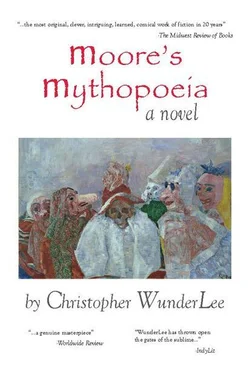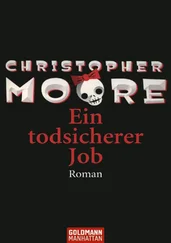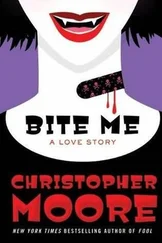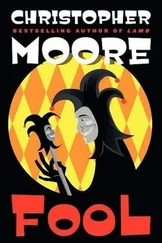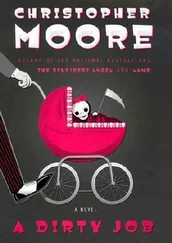Christopher WunderLee - Moore's Mythopoeia
Здесь есть возможность читать онлайн «Christopher WunderLee - Moore's Mythopoeia» весь текст электронной книги совершенно бесплатно (целиком полную версию без сокращений). В некоторых случаях можно слушать аудио, скачать через торрент в формате fb2 и присутствует краткое содержание. Год выпуска: 2010, Издательство: Picaro Editions, Жанр: Современная проза, Фантастика и фэнтези, на английском языке. Описание произведения, (предисловие) а так же отзывы посетителей доступны на портале библиотеки ЛибКат.
- Название:Moore's Mythopoeia
- Автор:
- Издательство:Picaro Editions
- Жанр:
- Год:2010
- ISBN:нет данных
- Рейтинг книги:3 / 5. Голосов: 1
-
Избранное:Добавить в избранное
- Отзывы:
-
Ваша оценка:
- 60
- 1
- 2
- 3
- 4
- 5
Moore's Mythopoeia: краткое содержание, описание и аннотация
Предлагаем к чтению аннотацию, описание, краткое содержание или предисловие (зависит от того, что написал сам автор книги «Moore's Mythopoeia»). Если вы не нашли необходимую информацию о книге — напишите в комментариях, мы постараемся отыскать её.
Moore's Mythopoeia — читать онлайн бесплатно полную книгу (весь текст) целиком
Ниже представлен текст книги, разбитый по страницам. Система сохранения места последней прочитанной страницы, позволяет с удобством читать онлайн бесплатно книгу «Moore's Mythopoeia», без необходимости каждый раз заново искать на чём Вы остановились. Поставьте закладку, и сможете в любой момент перейти на страницу, на которой закончили чтение.
Интервал:
Закладка:
The day Graham stood before the mirror, finishing his shave and moving onto some meticulous nose hair grooming, Elisa was thirty-three years old, unmarried, without children and unemployed. She did freelance garment design for a number of chic clothing lines but always refused full-time employment. As soon as one of the companies offered her a position, always very prominent, she never accepted another commission from them. She had gone to college in four different countries, at four different universities, had received twelve bachelor’s degrees, two masters and a doctorate in Egyptology.
Elisa lived in a house their father had bought as a summer get-away eighty kilometers outside the city. She did not use electricity and drove herself if she wanted to go anywhere. She stayed in her home all day and only went out at night (the Rye needing no further explication). The locals kept stores open late for her, where she could shop without others bothering her and she was often seen in late-night movie theatres. But, more often than any other place, she was seen in a booth at the Steamboat Saloon and Cocktail Bar, a rickety old establishment that clung to the cliffs hovering over the ocean. No one except one waiter was allowed to talk to her and she always drank the same thing, Black Label Beer out of the can. Elisa had an apparent stash of ethyl alcohol tablets and she plopped two of them into each serving, returning alcohol to the beverage. Every time she visited the Steamboat, she drank twenty-four beers in under four hours, got up with no signs of drunkenness and drove herself home. Her only other requirement was that the piano player stop while she was in attendance. This was done without question, with no objections by anyone in the crowd and with no anger from the musician, even though he was losing tip money while he wasn’t playing.
* * *
Recently, Graham Greene had met Haddie Springfield, the eighteen-year-old daughter of a shipping tycoon, at a social event. Haddie had a perian face that looked like a woman’s reflection in a china plate. She posed as though a fashion photographer was snapping pictures of her on location at an exotic beach when she was spoken to and said purposefully objectionable things in response to questions. They were not challenging observations, nor anti-social statements, but merely Thalian pronouncements in a conventional sense.
“Why Miss Springfield, where ever did you get your dress?” a socialite snob asked.
“My summer collection was all boosted from a department store truck I had some ruffians knock over for me,” she replied.
“Haddie, I must say you look beautiful tonight,” an elderly bachelor mentioned.
“You don’t have to say so, Bobbie, oh that’s right you do, you’re on father’s payroll.”
Haddie was an only child, her parents had invested a great deal in her birth and doctors spent four and a half years constructing the perfect gene profile for her. Still, Haddie’s monthly pharmacy bill was more expensive than most car payments and she refused to continue her education. She wanted only to work on her many hobbies and social engagements. She loved to entertain and was arguably the best hostess in the city. She held dances on a weekly basis, book discussion groups every month, a social club she ran met every Tuesday, and she had permanent reservations every four weeks at a concert hall. She loved to attend premiere parties, concerts, sporting events, and fashion shows. She spent her free time, which was every minute of every day, working on interior designs, playing the piano, practicing cock-ball, writing slogans for fictitious products, and sewing. She refused the acceptance letters of the major universities, who were obligated due to her social standing to court her, and left for Greece a month before her last year of secondary school was to begin. She was an A-lister who wanted to be treated like one before she could walk.
When Graham Greene, twenty years her elder, had introduced himself and talked with her for almost an hour, Haddie had fallen in love (in a Helvetian sense). She adored (venerating him expectantly) his life, his adventures, his accomplishments and his power. She saw in Graham all the liberties of a life she wished to lead, a life of repose, of excess, of parties and dinners and balls, a life of opera nights, world travel, and leisure. If she could be his wife, she would have all the money she needed, a perfectly fashionable husband that would please her father, her friends, and the society pages, a home that rivaled anyone’s on the planet, a name that was close to royalty, she would have the absolute ideal ( …the sovereign does as he pleases so long as he pleases the assassins ). Nothing in Haddie’s life would change. In fact, it would be improved. Haddie knew what kind of quest she was beginning, she knew about Graham’s girlfriends and independence. The trick was to make herself appear like the only other person in the world for him, as though she was the rib that covered his heart.
Graham wiped his razor clean and inspected his face. He was Graham Greene, he looked like him. If he wanted to see Haddie Springfield, all he needed to do was to go see her. Why the hesitation, why the nervousness? He was not usually so uncertain, Graham had only been nervous once in his life, that he could remember. But, for the life of him, he couldn’t remember when it was, what had happened that made him feel like his insides were boiling. He just knew that he had felt apprehension before. I’ve got to be confident; no one likes a coward. She’ll see right through me if I don’t retain my composure. I’ll go see her under a pretense of some sort. We’ll both know that it’s completely fictitious but that won’t matter. What really matters is how she reacts to my visit.
Graham was not at all certain why he wanted to see the young woman so badly. He knew, of course, that there was some interest he had for her, but he wasn’t sure how to qualify the feeling. He wasn’t sure if he was in love with her because she had immediately meant something to him or if it had more to do with her age. Haddie was eighteen years old, she was eighteen years old in a definitive way. Haddie did not appear older, nor did she seem to want to look older, like so many women her age. She acted eighteen and made no apologies for her ignorance. Haddie was the epitome of every teenage girl Graham had ever known, Gödelian and unapologetic. She was self-absorbed, knew nothing about anything, treated anyone older than forty like they belonged in a geriatric ward, had seen nothing, and had been all over the world and had misunderstood it completely. She was passionately involved in herself, she was like a child sitting at the grown-up’s table.
Graham found this attractive. He just wasn’t sure if he liked it because of its inherent innocence or because he, himself, had lost it long before. When Haddie had given her hand to him, Graham had taken it and put his other hand on her elbow to assist her out of her chair. He remembered the texture of her skin, he remembered the smell of her skin on his fingers, he remembered the way his hand had slid up her arm, he remembered how she had looked at him with a smile that seemed to know more about the event than he was prepared to admit. Graham had wanted to embrace her, kiss her, touch her skin, bury his face in her hair, feel himself inside her, feel himself battering against her ignorance, tearing her open so that he could explore her. And Haddie, with one glance, had seemed to know what he was thinking and seemed to find it amusing.
Graham doused his temples with hot water. She will be enticing for years to come, not like an older woman. Even after children, she’s young enough to regain her form. Graham wouldn’t admit it, not to the face in the mirror, but he wanted Haddie for far less than he gave her credit for. He finished dressing and left his home like a man who’s fought with himself and finally resolved to go to the whorehouse.
Читать дальшеИнтервал:
Закладка:
Похожие книги на «Moore's Mythopoeia»
Представляем Вашему вниманию похожие книги на «Moore's Mythopoeia» списком для выбора. Мы отобрали схожую по названию и смыслу литературу в надежде предоставить читателям больше вариантов отыскать новые, интересные, ещё непрочитанные произведения.
Обсуждение, отзывы о книге «Moore's Mythopoeia» и просто собственные мнения читателей. Оставьте ваши комментарии, напишите, что Вы думаете о произведении, его смысле или главных героях. Укажите что конкретно понравилось, а что нет, и почему Вы так считаете.
